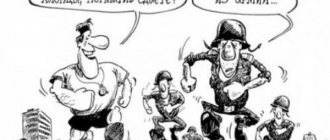Section articles:
- Reclassification of the actions of the accused from Part 2 of Art. 339 of the Criminal Code on Part 1 of Art. 149 of the Criminal Code.
- Reduction of punishment under Part 3 of Art. 339 CC
- Reclassification of the actions of the accused. Termination of criminal proceedings
Hooliganism is a fairly common offense in modern society. They speak of hooliganism when there is obscene language, public insults, harassment of citizens, damage to property and other similar actions. Hooliganism, as they say, “is subject to all ages”: both teenagers and adults commit hooliganism, and people of different genders, professions and levels of education. Many people believe that this is a sign of lack of upbringing. But when such behavior directly threatens the health of other people or property, then such actions are no longer subject to administrative, but to criminal liability.
There is a distinction between petty hooliganism, for which administrative liability is provided, and criminal hooliganism (Article 339 of the Criminal Code).
Petty hooliganism covers such actions as obscene swearing in public places, gross harassment of citizens, insults, and any other actions that disturb the peace of people and public order. Petty hooliganism entails administrative liability.
The spectrum of hooliganism is diverse - from small mischief, scandals to daring offenses involving the use of violence and causing significant harm to citizens.
In order for hooligan actions to entail criminal, much more stringent liability, it is necessary to establish that these actions are associated with the use of violence (or the threat of its use), damage to someone else's property, or are associated with exceptional cynicism. And if everything is clear with the use of violence or damage to property, then exceptional cynicism is an evaluative category. Whether or not there are signs of exceptional cynicism can only be determined by a court.
In practice, exceptional cynicism is understood as such actions that are not accepted and condemned by society - abuse of the sick, of cultural values, etc.
The help of an experienced and qualified lawyer in cases of hooliganism is a sure way to mitigate the punishment, and even re-qualify the article.
The lawyers of the Law Office “Maslov, Gashinsky and Partners” have extensive experience in this category of cases and will understand all the nuances of even the most complex hooliganism case.
The defense attorney can intervene in the process at any stage of the case: at the stage of preliminary investigation, during court proceedings, or at the stage of appealing the verdict. Of course, the sooner you seek legal assistance, the greater the chances of a positive outcome of the case.
Hooliganism is often similar to many other crimes related, for example, to causing bodily harm. In order to distinguish between different categories of crimes, it is necessary to establish the presence of a hooligan motive.
That is, the first thing to do is to decide whether a hooligan motive is seen in the person’s actions.
It should be remembered that the crimes provided for in Part 1 and Part 2 of Article 339 of the Criminal Code are less serious crimes - that is, for such crimes, reconciliation with the victim is possible with subsequent release from criminal liability.
Part 3 of this article provides for hooliganism with the use of weapons, which is a more serious crime and does not provide for the possibility of reconciliation with the victim.
In the practice of the Law Office "Maslov, Gashinsky and Partners" there are positive cases of termination of criminal cases (due to reconciliation with the victim or lack of proof of the crime).
The main goal and task of a lawyer in this category of cases is to develop, together with the client, a legal position, submit petitions to the investigation to conduct investigative actions, requests to the competent authorities to provide information and other active actions.
Even if the accused admits his guilt, a careful study of the case materials may lead to the establishment of the person’s innocence.
Case No1.
In the practice of lawyer Stashkevich Yu.G. There was a case of termination of a criminal case under Part 2 of Article 339 of the Criminal Code due to reconciliation with the victim.
In practice, criminal cases for hooliganism are not always terminated due to reconciliation with the victim, and especially under Part 2 of this article.
The peculiarity of this case is that the accused, for a minor reason, started a scandal and a fight with the bus driver, as a result of which he broke the windshield.
The case was initiated under the second part of the article, since the hooligan actions were associated with resistance to the person who was trying to stop them.
With the assistance of lawyer Stashkevich, the accused managed to reconcile with the bus driver.
But as a result of hooliganism, both the driver and the bus were injured. In this case, in order to resolve the issue of reconciliation with the victim, it was necessary not only to reconcile with the driver, but also to pay off the damage and receive a letter from the bus fleet stating that there were no claims against the accused.
Having made the necessary request, the lawyer received a petition from the bus depot stating that the damage had been paid off and there were no claims against the accused.
As a result, the court dismissed the case.
Hooliganism (Article 339 of the Criminal Code of the Republic of Belarus)
Hooliganism is understood as deliberate actions that grossly violate public order and express clear disrespect for society, accompanied by the use of violence or the threat of its use, or the destruction or damage of other people's property, or characterized by exceptional cynicism in their content.
Lawyer and hooliganism case
Hooliganism in its legal composition has common features with other illegal acts: against a person and property, against the order of management. As a result, in some cases a serious dispute may arise regarding the legal assessment of the act committed. And the role of a lawyer in this dispute is difficult to overestimate.
For example, is damage caused to the property of a particular citizen a circumstance constituting hooliganism? The answer depends on many variables. If the suspect/accused knew the victim, but was on hostile terms with him, and this became the motive for causing harm, then in this case there is no element of hooliganism. And if the accused never knew the victim before and caused harm in the absence of visible reasons, then the elements of hooliganism exist.
This example is “idealistic” because I “neglect” details and nuances in order to explain the essential features of the issue. At the same time, it is in the nuances of interpersonal relationships between people and the actual circumstances of the case that what is important lies, which ultimately influences qualifications.
Acts falling under Article 339 of the Criminal Code of the Republic of Belarus are not a rare occurrence in legal practice, which, however, does not prevent them from being quite complex from a legal point of view. I have already identified one factor. There are many others, the specification of which is only possible in relation to a specific case.
For example, is hooliganism subject to qualification under part three on the basis of: the use of objects used as weapons? What items can be considered items used as weapons? But these questions influence whether charges will be brought under Part 1 or Part 3 of Article 339 of the Criminal Code of the Republic of Belarus.
During the consultation, the lawyer will give his legal assessment of the situation, express his view on the factual circumstances, taking into account which, and also subject to entering into a criminal case as a defense attorney, together with the client (defendant), a legal position on the case and methods of defense will be developed.
The amount of a lawyer's fee in criminal cases of hooliganism
| # | Name of legal assistance | Fee in rubles |
| 1 | Oral consultation | from 60 |
| 2 | Drawing up a procedural document (except for an appeal/supervisory complaint) | from 200 |
| 3 | Conducting a case during an investigation / for 1 investigative action (within the same working day) | from 250 |
| 3 | Conducting a case in court / for 1 court session (within the same working day) | from 250 |
| 4 | Familiarization with the materials of the criminal case | from 200 |
| 5 | Drawing up an appeal/supervisory complaint against a court verdict | from 200 |
| 6 | Drawing up a lawyer's request (provided together with other legal assistance) | from 30 |
| 7 | Other legal assistance in criminal cases | by agreement |
Make an appointment with a lawyer
(in Minsk) you can call the phone number: +37529-3614333.
"Auto-hooliganism." What offenses on the road can be punished as a “criminal”?
We continue to summarize the past year. Last time we collected the most curious and instructive stories of the year that were caught on DVRs. Today, let’s remember what kind of “hooliganism” our compatriots dared to do (and did not go unnoticed by law enforcement agencies) this year.
He took out his penis and started shaking it
In this non-trivial way, the passenger of a car stopped for lack of technical inspection decided to get into the news reports (watch from 1.35).
As Alexander Ivashnev, traffic police inspector of the State Traffic Inspectorate of the Mogilev Regional Executive Committee, told the Mogilev TV and Radio Broadcasting Company, “during the administrative process, one of the passengers got out, lowered his pants, took out his genitals and began to shake them.” As a result, the passenger was detained and taken to the police department. A criminal case was opened against the man under the article “Hooliganism”.
Dancing on the roof of the car while driving
The incident occurred in mid-spring in Brest. The duty department received several calls from eyewitnesses who reported that a BMW car was driving around the city streets, with passengers dancing on the hood and roof of it.
No matter how surprising it may sound, the driver of the car was sober. However, this did not save him from drawing up protocols for violating the rules for transporting passengers (Part 5 of Article 18.14) and driving a car without the “necessary documents” (Article 18.18). Later, he was deprived of his “rights” for creating an emergency situation (Part 10 of Article 18.14) and received a fine of 20 basic (420 rubles).
It was never possible to find out what prompted the “dancers” to climb onto the roof of the car. However, given that the young people were drunk, the question does not seem so difficult. In relation to the three dancing passengers, protocols were drawn up for violating traffic rules: “by other road users who were intoxicated” (Part 2 of Article 18.23). And then also under Article 17.1 “Hooliganism”. Was the dancing worth the candle?
Cut the tires on his girlfriend's car so she wouldn't go to clubs
The story began very prosaically: one morning the girl saw that someone had cut the tires on her car and contacted the police. And although it took a little over a month to search, the answer was nearby all this time. The culprit turned out to be her boyfriend.
As often happens in such cases, the cause turned out to be jealousy. According to him, the girl too often rested with her friend in entertainment venues in the city. And they went there in the victim’s car. Apparently, he figured that if there was no car, there would be no problems. So I decided to at least temporarily disable the vehicle. Now a criminal case has been initiated against the young man under Article 339 of the Criminal Code of the Republic of Belarus “Hooliganism” (the maximum possible punishment under the first part is imprisonment for up to 3 years)
Drank in someone else's car and then burned it
In this story, everything is so banal: he got drunk and started getting rowdy. Only the methods I chose were very original. First, I accidentally punctured the tires of nearby cars. Then he broke into someone’s car and continued drinking while it was warm (despite the fact that it was June, it was already getting colder after sunset). Finally, realizing that he had broken into someone else's car to hide the crime, he set the car on fire.
The car owner saw what was left of his vehicle only in the morning. The attacker was found quite quickly. It turned out that over the previous days he had already become familiar to local residents with his inappropriate behavior. As it later became known, a criminal case was opened against the guy for arson and hooliganism.
Got angry that no one was stopping and threw a stick at a passing car
“Man is man’s friend, comrade and brother.” This is one of the principles of the “Moral Code of the Builders of Communism.” But we have not believed in communism for a long time, which means it is not necessary to adhere to the principles. But not everyone will agree with this.
So, in Borisov, one driver’s car broke down on the road. When he realized that he couldn’t figure out the problem himself, he began to stop cars passing by. For a long time no one wanted to stop, and the man began to get angry at this state of affairs. Soon he could not stand it anymore and threw a wooden block at a passing BMW.
Despite the fact that he managed to stop the car, he, naturally, did not receive any help. Quite the contrary. Some time later he was detained and taken into custody. A criminal case was initiated against him under Part 1 of Article 339 of the Criminal Code of the Republic of Belarus “Hooliganism”.
Later it became known that this Borisov resident had already come to the attention of the police. In 2014, he deliberately drove a newly purchased Mercedes-Benz into an Almi store, smashing the doors and scaring customers.
As the portal Vborisove.by writes, then his condition did not allow him to interview the driver after the accident. He was hospitalized at the Republican Scientific and Practical Center for Mental Health. “The driver was in poor condition. He has been registered with the Republican Scientific and Practical Center for Mental Health for 8 years (in Novinki - Ed.), perhaps he had an exacerbation of mental illness,” Borisov State Traffic Inspectorate representative Irina Pakhtusova said at the time.
Well, such information can certainly explain the behavior of the driver in a recent situation. But at the same time, the question is very pressing: is it worth allowing him to drive a vehicle in the future?
Taxi passenger punches driver for refusing to buy him beer
The incident occurred in early October in Grodno. The young man called a taxi to take him to Dzerzhinsky Street. The driver delivered the customer to a gas station, where he intended to buy alcohol. True, the client did not have the money, and he asked the taxi driver for it. The driver explained that their organization does not issue money on credit. After refusing, the man asked to be taken to another address. On the way, the passenger lost his temper. He pushed the driver in the head, and when the car stopped, he hit him in the face. Then he explained to the driver how wrong he had been in refusing to lend money. Then he swore at the young man and ran away.
After the incident, the driver contacted the police. Employees seized the recording from the video recorder and also spoke with employees of the gas station where the passenger was spotted. In addition, the man provided his details to the taxi operator when he ordered the car. Thus, it was possible to quickly get on the trail of the attacker, who had not previously been prosecuted.
Now a criminal case has been opened against the young man under the article “Hooliganism”. The most severe sanction of the article under which the attacker will be judged provides for up to three years in prison.
Drifted on Victory Square
And finally, the “freshest” hooliganism. A guy driving a Mercedes-Benz S300 drove to the site of the memorial monument to soldiers and partisans who died during the Great Patriotic War of 1941-1945. on Victory Square and sent the car into a controlled skid. How do law enforcement agencies characterize the action of a 27-year-old Minsk resident:
“The young man is suspected that on November 29, from 1:30 to 1:50, while on Victory Square, in the presence of strangers, he deliberately, out of hooligan motives, expressing clear disrespect for society and with exceptional cynicism, drove a Mercedes car Benz S300 onto the site of the monument, which was obviously not intended for the movement of vehicles, and, having entered the car into a controlled drift, drove about three circles around its axis (“drifted”), which grossly violated public order.”
After traffic police officers passing by noticed the drifter, the driver tried to escape, but was soon stopped.
Now a criminal case has been opened against a young man who has all categories of “rights” and who was sober at that moment under Part 1 of Article 339 of the Criminal Code “Hooliganism.” The investigation will also have to give a legal assessment of the driver’s actions under Article 346 of the Criminal Code “Desecration of historical and cultural values.”
Roman SAVINICH ABW.BY
Liability for bribery
Responsibility for corruption crimes "bribery"
Responsibility for bribery arises regardless of the time of transfer of the bribe: before or after the commission of an action (inaction) in the interests of the bribe-giver or the persons represented by him.
Article 430 of the Criminal Code. Receiving a bribe
- Acceptance by an official for himself or for close ones of material assets or the acquisition of benefits of a property nature provided solely in connection with his official position, for patronage or connivance in the service, favorable resolution of issues within his competence, or for performance or non-performance in the interests of the giver a bribe or persons represented by him of any action that this person should or could have performed using his official powers (receiving a bribe), -
shall be punishable by restriction of freedom for a term of three to five years with deprivation of the right to hold certain positions or engage in certain activities, or imprisonment for a term of up to seven years with confiscation of property and with deprivation of the right to occupy certain positions or engage in certain activities.
- Receiving a bribe repeatedly, either by extortion, or by a group of persons by prior conspiracy, or on a large scale -
shall be punishable by imprisonment for a term of three to ten years with confiscation of property and deprivation of the right to occupy certain positions or engage in certain activities.
- Actions provided for in parts one or two of this article, committed by a person previously convicted of crimes provided for in Articles 430, 431 and 432 of this Code, or on an especially large scale, or by an organized group, or by a person holding a responsible position -
shall be punishable by imprisonment for a term of five to fifteen years with confiscation of property and deprivation of the right to occupy certain positions or engage in certain activities
Article 431 of the Criminal Code. Giving a bribe
- Giving a bribe -
shall be punishable by a fine, or correctional labor for a term of up to two years, or arrest, or restriction of freedom for a term of up to two years, or imprisonment for a term of up to five years.
- Giving a bribe repeatedly or on a large scale -
shall be punishable by restriction of freedom for a term of up to five years or imprisonment for a term of two to seven years.
- Giving a bribe by a person previously convicted of crimes provided for in Articles 430, 431 and 432 of this Code -
shall be punishable by imprisonment for a term of five to ten years with or without confiscation of property.
Note. A person who gives a bribe is exempt from criminal liability if a bribe was extorted against him or if this person, after giving a bribe, voluntarily declared what he had done.
Article 432 of the Criminal Code. Mediation in bribery
- Direct transfer of a bribe on behalf of the bribe giver or bribe recipient (mediation in bribery) -
shall be punishable by a fine, or arrest, or restriction of freedom for a term of up to two years, or imprisonment for a term of up to four years.
- Mediation in bribery, committed repeatedly, either using one’s official powers, or when receiving a bribe on a large scale -
shall be punishable by arrest, or restriction of freedom for a term of up to five years, or imprisonment for a term of up to six years.
- Mediation in bribery committed by a person previously convicted of crimes provided for in Articles 430, 431 and 432 of this Code, or when receiving a bribe on an especially large scale -
shall be punished by imprisonment for a term of three to seven years.
Note. A person guilty of mediation in bribery or an accomplice in giving or receiving a bribe is exempt from criminal liability if, after committing criminal acts, he voluntarily declared what he had done.
Article 433. Acceptance of illegal reward
- Acceptance by an employee of a state body or other state organization who is not an official of property or other benefits of a property nature provided to him for an action (inaction) committed within the limits of his official powers (job duties) in favor of the person providing such property or other benefit of a property nature , or for work performed that is part of his official (labor) duties, in addition to the remuneration provided for by the legislation of the Republic of Belarus -
shall be punishable by a fine, or deprivation of the right to hold certain positions or engage in certain activities, or correctional labor for a term of up to two years, or arrest, or restriction of freedom for a term of up to three years, or imprisonment for the same term.
- The same actions, committed repeatedly, either by extortion, or by a group of persons by prior conspiracy, or on a large scale -
shall be punishable by restriction of freedom for a term of up to five years or imprisonment for the same term with deprivation of the right to occupy certain positions or engage in certain activities or without deprivation.
- Actions provided for in parts 1 or 2 of this article, committed on an especially large scale -
shall be punishable by imprisonment for a term of three to eight years with confiscation of property or without confiscation and with or without deprivation of the right to occupy certain positions or engage in certain activities.
Article 396 of the Criminal Code. Pretending to receive a bribe, illegal reward or commercial bribery
Transferring money, securities, other property to an official, an employee of a state body or another state organization who is not an official, or an employee of an individual entrepreneur or legal entity, or providing services of a property nature for the purpose of artificially creating evidence of a crime or blackmail -
shall be punishable by a fine, or arrest, or restriction of freedom for a term of up to five years, or imprisonment for the same term.
Law of the Republic of Belarus of July 15, 2015 “On the fight against corruption”
Article 39. Guarantees for individuals who contribute to the detection of corruption
An individual who reports an offense that creates conditions for corruption, a corruption offense or otherwise contributes to the detection of corruption is under state protection .
An individual who helps identify corruption, his spouse, close relatives or relatives, if there is sufficient data indicating that there is a real threat of murder, violence, destruction or damage to property, or other illegal actions against them, is guaranteed measures to ensure security in the manner established by legislative acts.
An individual who helps identify corruption, in cases and in the manner determined by the Council of Ministers of the Republic of Belarus, is paid remuneration and other payments that are not indicated in the declaration of income and property.
Attention!
The “Helpline” of the health care institution “Minsk Clinical Consultative and Diagnostic Center” 8(017)224-04-45 was organized to receive anonymous requests about existing cases of corruption offenses in the health care institution “Minsk Clinical Consultative and Diagnostic Center”. The telephone operates 24 hours a day with an answering machine.”
Evasion of military service duties by feigning illness or other means
1. Evasion of a military serviceman from performing the duties of military service by feigning illness, or causing himself any harm (self-mutilation), or forgery of documents, or other deception -
is punishable by restriction on military service for a term of up to one year, or by arrest for a term of up to six months. , or detention in a disciplinary military unit for a period of up to one year.
2. The same act, committed for the purpose of complete exemption from military service duties, -
is punishable by imprisonment for a term of up to seven years.
Commentary to Art. 339 of the Criminal Code
1. The objective side is expressed by inaction - evasion. However, the methods of such evasion are characterized by the commission of active actions, the list of which is established by law.
Feigning a disease should be understood as a false portrayal of a disease or its individual symptoms by a person who does not suffer from the disease, or a deliberate exaggeration of the signs of an existing disease.
Self-harm is deliberate artificial damage to various organs or tissues of the body, disruption of their functioning.
Forgery of documents consists of entering deliberately false information into documents, correcting them in ways that do not correspond to reality (intellectual falsification of documents), as well as producing an initially false document (physical falsification).
Other deception involves reporting any false information (active deception) or concealing any essential information (passive deception) about circumstances the existence of which allows a person not to perform military service duties (for example, about circumstances that grant the right to a deferment from conscription).
2. The duration of evasion of military service duties does not matter for the completed crime. The composition is completed from the moment the evasion begins.
3. The subject of the crime is a military serviceman performing military service under conscription or contract. Along with him, the perpetrator of this crime may be another person who, at the request of a serviceman, causes harm to the latter’s health or forges a document. In this case, the criminal actions of such a person are subject to qualification under a set of crimes as aiding in evasion and a corresponding crime against the person (for example, provided for in Article 111 or 112 of the Criminal Code) or the order of management (Article 327 of the Criminal Code of the Russian Federation).








